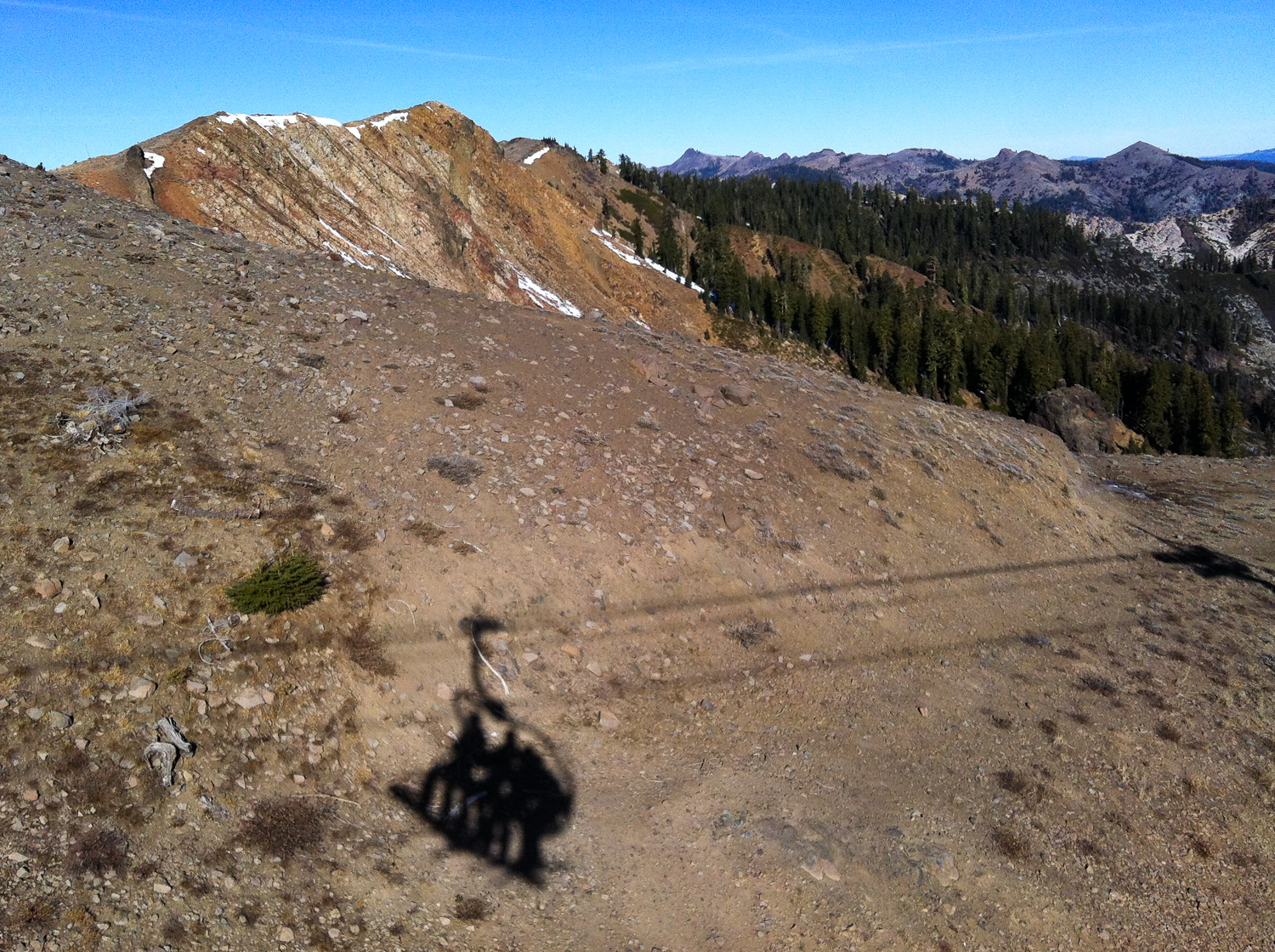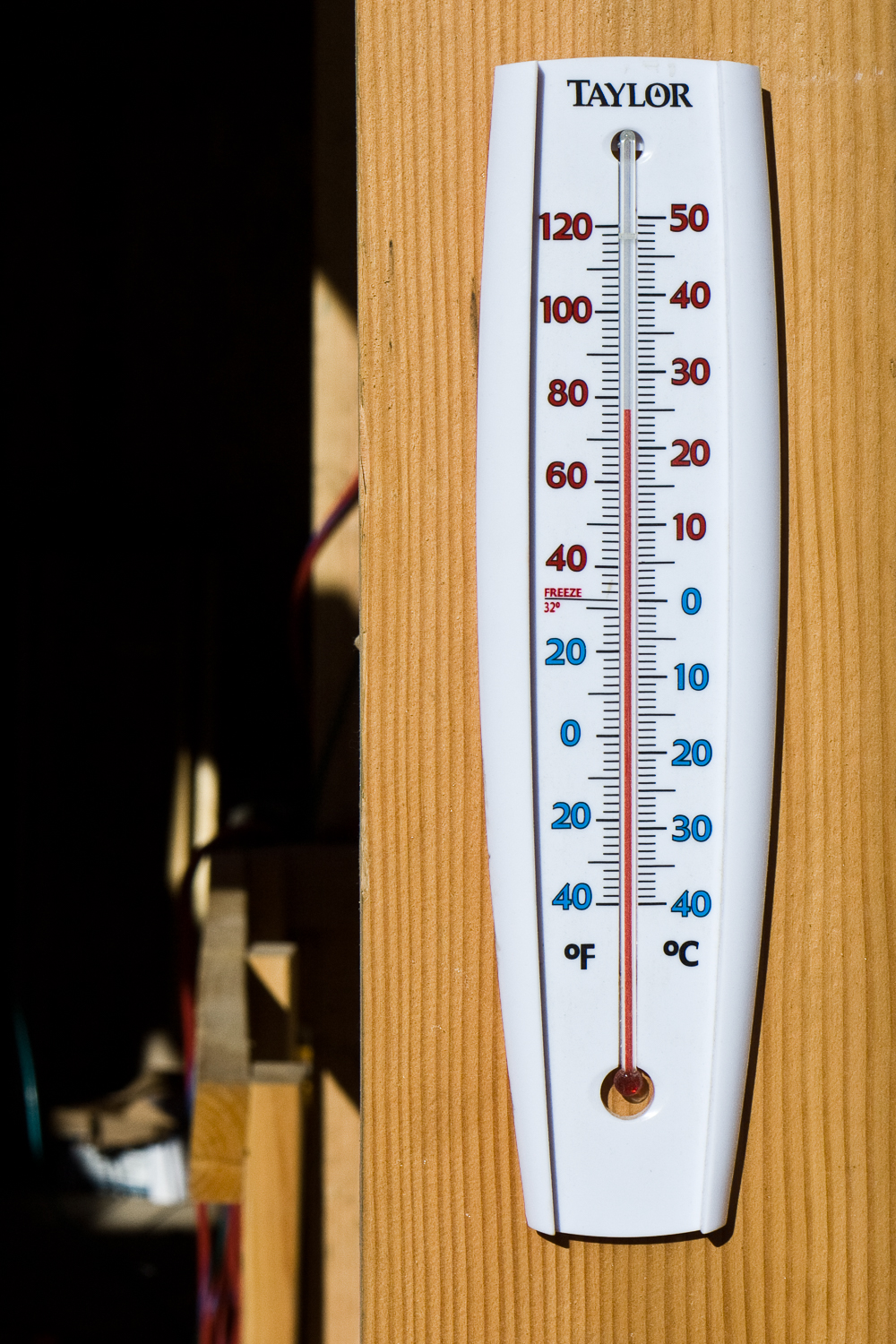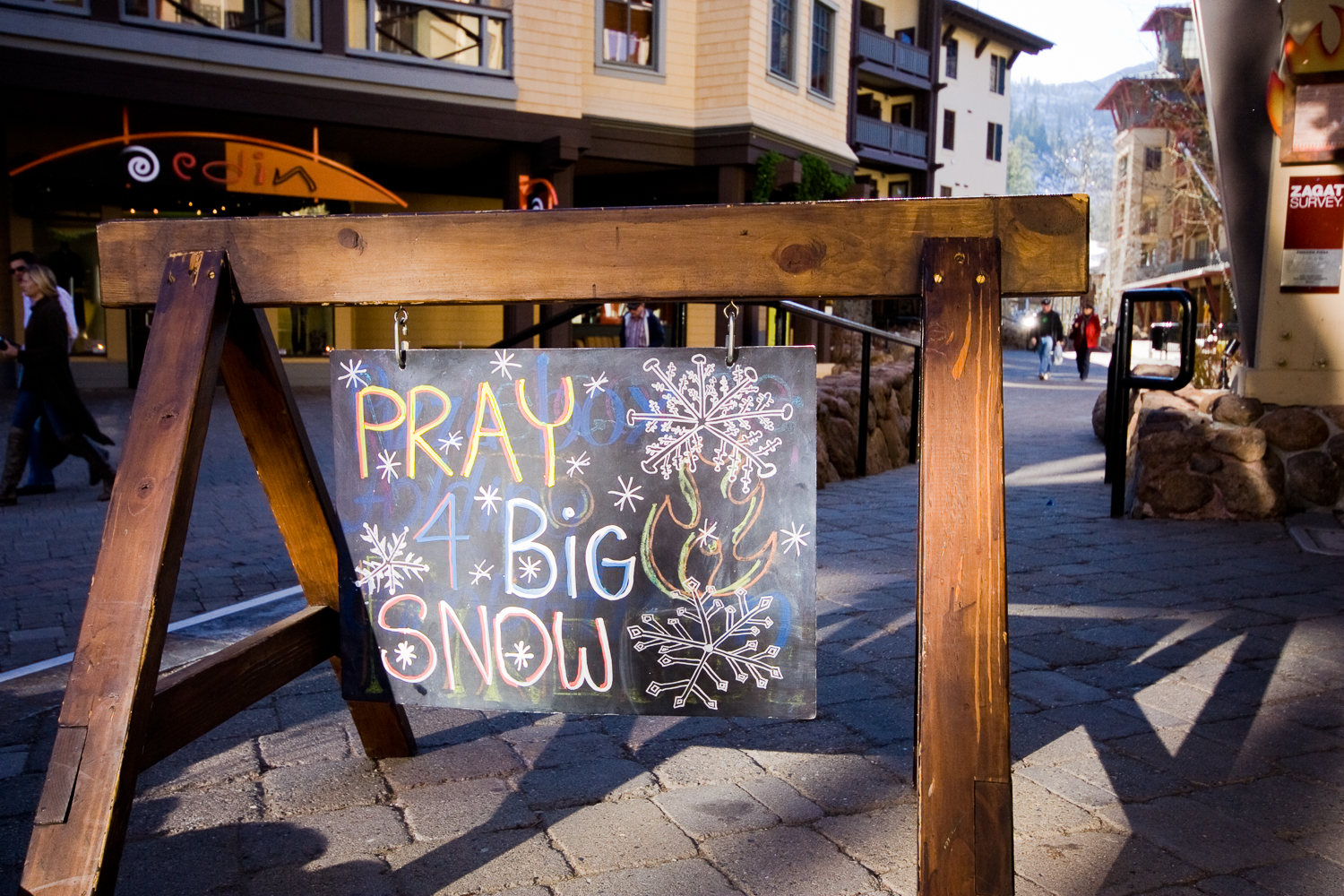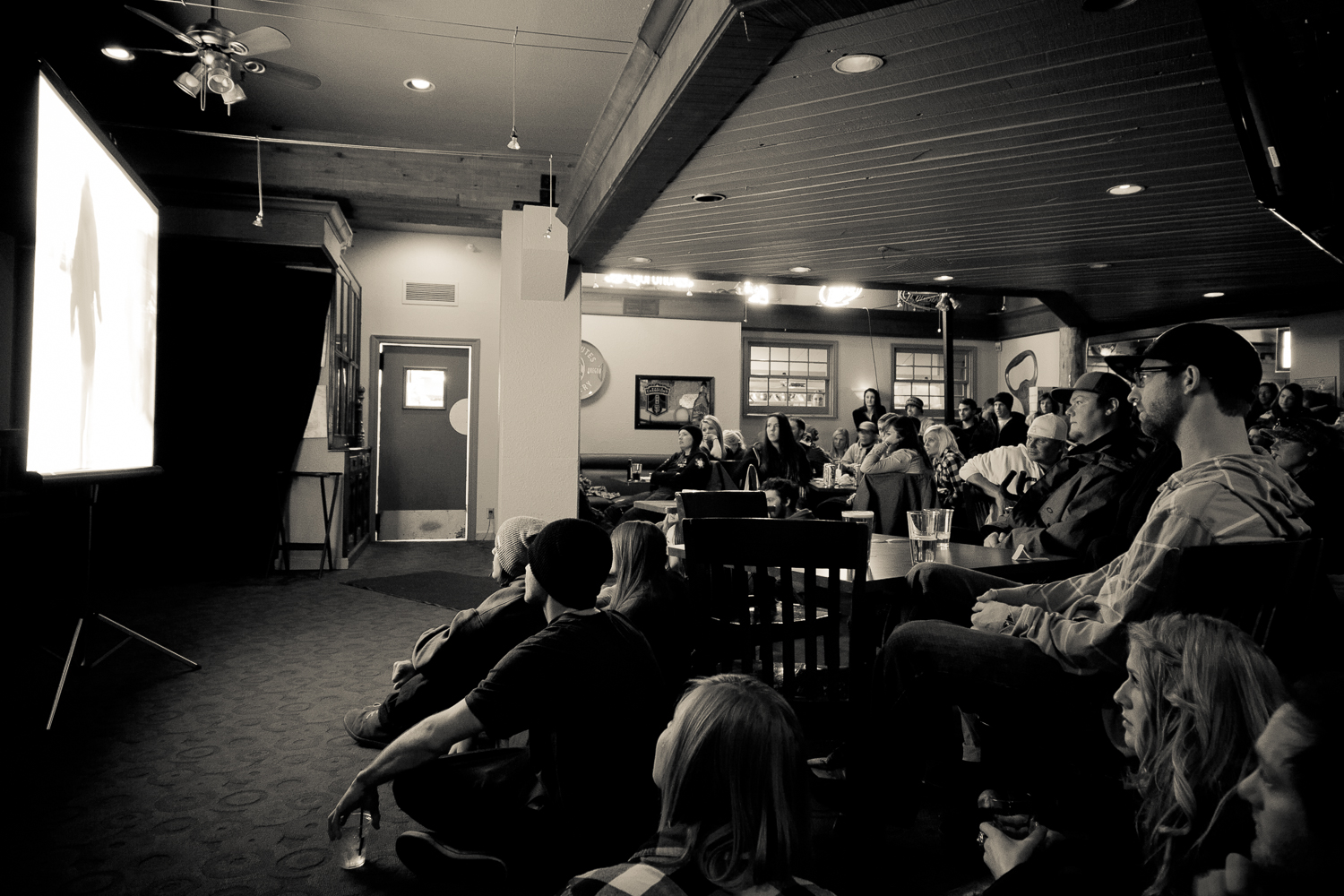No Snow

A perspective on the winter of 2012, from those who lived it.
It’s late January of 2012 in Lake Tahoe, California. Fresh off the driest December since 1883, the snowflake – a most beloved friend – remains elusive. Each approaching storm, as if utterly exhausted from endless dumping last year, yawns at the California border, unable to muster the energy to drop south.
At the resorts, just a few lonely lifts spin. Exposed rocks and trees dominate the normally snow-blanketed landscape. For the first time ever, I can actually see the underbelly of the terrain I usually float over. It’s pretty, but I really don’t want to see it right now.
Hitting 65 degrees daily, people continue to mountain bike and rock climb. They’re fleeing to Mexico and Utah to rid the jitters. People are praying for snow, dreaming of fresh powder shots, and I can sense it in every conversation – people are anxious. Really anxious.
How do the people of a mountain town get by when a historically dry winter settles in and refuses to leave?
I spent a week in North Lake Tahoe to better understand this question.
I talked with pro skiers, hitchhikers, bartenders, business owners, construction workers, Argentinian imports, and more. Their collective stories showed me that when things get really bad, the true values of a mountain town emerge.
SURVIVAL, OPTIMISM, AND A DASH OF SHITTY
It was Tuesday afternoon as I rolled into Truckee from San Francisco. My stomach mirrored my gas tank – light on, needle drooping well below ‘E.’ I needed my sugar fix, and I knew exactly where to get it – The Treat Box Bakery.
“I’m surviving, like everyone else. It’s just what you do in the mountains.”
Lee Dufresne, the owner of 35 years, greets me warmly. He plops my chocolate old-fashioned donut into its bag, talking about the winter in a low, slow tone. “Never seen anything like it in my 35 years in business,” he says. “We rely on the workers, and they ain’t working.” I ask Lee how he’s getting by.
Lee’s right. As survival instincts atrophy in modern society, they stay fully alive in our mountain towns. Whether braving stormy summits or small-town economic realities, people choose the mountain lifestyle for a reason – it’s intimate.
As I square up with Lee, I realize I don’t have cash. “Don’t worry about it,” Lee says. “Pay me next time, it’ll bring you back.”
Stuffed with Lee’s generosity and donuts, I make way to the cabin I lease at Squaw Valley (yep, I’m that guy). Before I get there, I see Mountain Mikes Sports, a staple in the Squaw Valley landscape since 1988. These winter sports guys have got to be hurting? I walk in.
Mike Pavel, the owner and Squaw resident since 1978, confirms my suspicion. Mike is a relaxed and extremely sharp guy – he’s weathered this before. “Look,” he says matter-of-factly, “this has been the worst winter ever for my business. We’re down 50%, and I’ve had to lay off everyone… 6 or 7 employees.” Mike continues, “We don’t feel the effects of the recession here (since skiing is a wealthy sport), but we’re in the middle of a snow recession right now.” Then in a contrasting tone, Mike says, “A true local enjoys this place no matter what. We love it here.”
I thank Mike and stroll down to the Village at Squaw Valley. I can count the people on one hand and zero English is being spoken. I feel like I’m in Switzerland. Could the foreigners not escape their vacations? Why else are they here skiing the icy death groomers?
As I ponder that, I notice Village Real Estate and walk inside. Kristina Bergstrand, the pleasant and attractive young owner, greets me with a question. “Are you looking to buy a vacation home?” I’m not sure whether it’s my scruffy beard or stained puffy that give it away, but I politely decline.
Kristina is nervous. “I’m really scared. We’re not seeing the emotional buys we normally see.” Apparently big powder dumps – which rolled in almost daily last year – inspire people to pull the trigger on property. While most of us are sipping $3 aprés Coors, others are throwing down a huge payment for their dream home. Who knew? Like Mike, Kristina is staying optimistic. “Last year was a phenomenal year,” she says. “We’ll see a lift [in business] when the snow picks up. It’s dismal now, but when it hits, it’s going to hit hard.”
I don’t know why, but Kristina’s optimism makes me want a beer. Plus it’s happy hour, so I find the nearest bar – Mamasake Sushi. I’m one of two people there.
“Home” by Edward Sharpe blares overhead, reflecting harshly off the polished floor and empty seats and tables, as if Edward himself is performing angrily in a tiny hangar.
“How’s it going?” I ask the bartender.
“Shitty,” he responds.
“It’s weird man, usually we have an hour wait right now.”
(he gestures around the empty bar)
“Are tips down?” I ask.
“They’re not great, people are just sitting around trying to save money.”
Visibly flustered by the boredom this winter has imposed, he tries to busy himself. Pace. Check phone. Wipe counter. Pace. Check phone. Clear drinks. Wait, which drinks? There’s no one here?
I barely finish my beer before he buses it, throws on his backpack, and rushes out. I catch him at the door (I haven’t paid) and ask where he’s going. “To my second job,” he says. “I’m a DJ at Truckee 101.5FM. Check me out 7-10PM every Tuesday night.” I scribble a note: check out 101.5FM next Tuesday / bartender, DJ dude’s show.
A PRO SKIER AND A HITCHHIKER LIVING WITHOUT SNOW
It’s Thursday and the week is beginning to slip away.
Luckily Michelle Parker, the Truckee born and Squaw groomed pro skier, agrees to meet for lunch. Parker, 24, is one of those people who just makes you feel good about the world. Wearing an infectious smile, she talks (and listens) with purpose – balancing out her naturally laid-back style. Her skiing career hasn’t made time for college (yet), but you’d think she has multiple degrees. A self-proclaimed “creator” – managing her own brand from an early age – Michelle passionately tackles life’s challenges.
Last winter, on January 3rd, she faced a really terrible one. Her boyfriend, pro snowboarder Danny Toumarkine, suffered a traumatic brain injury (TMI) after a routine jump in Montana went horribly wrong. Michelle tells me, “Danny’s had an unbelievable recovery,” going from a coma to boarding again in just a year. “We want to get his story out,” she says.
“I’m so glad it’s not puking or we never would have hit our deadline.”
Danny’s story, a documentary produced by the Shreddy Times crew, is called “Moving Forward.” It focuses on helmet awareness, as Danny wasn’t wearing one during his accident. Michelle is thankful for the extra time the dry winter is providing. “I’m stoked I have something else to put my time into [besides skiing],” she says.
Though she’s staying busy, Michelle has skiing on the brain – after all, her living depends on it. “Around New Years, I snapped,” she says. “I thought what the hell? I stopped checking the weather. Everyday I went to yoga twice, ran, and hit the gym.” I ask if she’s worried about being ready for her upcoming shoots with Matchstick Productions. “I was really worried about that at first,” she says, “but that’s why I’ve been working out so hard – so I can do lots of laps when it’s time.”
Thoroughly inspired by Michelle’s approach to the dry winter (and life), we pay and I hit the road. Almost immediately, I see a hitchhiker on the side of Highway 28. Should I? I pass, but then – peering over at my lonely passenger seat – flip the wheel and motion him in. (Cue cheesy announcer voice) Alex Knuuttunen ladies and gentlemen.
Alex embodies the stoke of living in the mountains. His unkempt winter beard and eternal smile reveal he’s a Tahoe freshman – a New Hampshire native who moved out after relishing in last season’s epic dumps. Alex is on his way to Squaw (much faster now) to hot tub with his buddies. After 6 straight days of beating themselves up in the park, it’s their rest day.
“My winter is going awesome,” Alex says. Really? “I’m treating it like it’s summer,” he says. “I’ve been hanging out on the lake, hot tubbing, and skiing a lot too. I’ve got 38 or 39 days in already.”
I ask how he’s making money and surviving. “I’m a bartender at Alpine,” Alex responds. “I’ve only gotten 3 shifts so far, but it’s good money, $250-300 per shift.” Damn that is good money, say $5,000 per month. I ask if he’s excited to work 5 days a week when winter finally hits. “No,” he says, “I want to work 2 days a week and ski the rest.” Classic. He tells me his dad sent him a big package of meat, which he’s been stringing out for a month, and he’s totally fine “eating a lot more Ramen.”
As I drop him off at his buddies’ apartment for the hot tub escapade, I ask how his roommates are doing. “Well,” he says, “three of them just sit around bitching, but I go skiing 6 or 7 days a week.”
It’s impossible to not be completely re-energized after ten minutes with Alex. I got more out of that ride than Alex did – for he allowed me to realize my vision of ski bum Jesus.
ALL IN THE FAMILY
So far, I had talked to a lot of people fending for themselves, finding creative ways to stay busy, to stay alive. But there must be others experiencing the opposite, reaping the benefits of the summer-like weather? Considering I was being woken up every morning at 8AM by banging next door, I knew exactly who to talk to.
Walking into the construction zone of contractor Dean Hall, I find myself surrounded by 10 men working feverishly on a gargantuan house. “Um… can I talk to the foreman?” I feebly utter. “That’s Gary, he’s up top there,” answers the nearest worker. I climb the unfinished stairs to meet the hearty handshake of Gary Diego.
Gary’s tough, an older man of Italian descent, maybe 5’7”. He’s been building for 33 years, and I can tell by looking at his hands – battered and creased like the mountains we play on – that he’s worked hard for 33 of them. Simultaneously warm and terse, I like Gary immediately.
“This winter has been fantastic for us. We’re loving it” he says. “Last year at this time, we were shoveling snow for 5 days straight just to dig out.” (I was surprised to learn if the owners pay to ‘dig out’ after storms cycles, construction can progress year round).
Hanging with Gary’s crew reminds me of being with my friends – lots of dudes bullshitting about nothing. I join in their 1:15PM (on the dot) lunch break and notice a younger member of the crew. He has already stomached a full pizza, burrito, and a can of soup. He’s still going.
His name is Pablo Creres. Pablo, 26, is a Truckee resident. He immigrated from Mexico 10 years ago. Pablo loves living here, smiling widely as he talks about his winter. “I worry about the others,” he says. “We need the rich people to come up and spend money.” I push him, since this weather is serving him well, and he pushes right back. "Yes, you’re right. I’m doing great, but we have to think about the others."
He continues, “The maintenance guys are hurting. They cut grass in the summer and plow snow in the winter, but there’s no grass to cut and no snow to plow.”
Pablo’s statement stops me. I’m talking to a first generation Mexican-American, falsely targeted by some Americans for draining the system. Yet Pablo, who’s reaping a nice winter paycheck, cares only about his fellow man’s struggle. Before I leave town, I find that Pablo’s commitment to community is not unusual.
First, I stumble into Ed Bokinskie, the Administrative Director at the Truckee Tahoe Community Foundation. TTCF connects wealthy donors with impassioned causes, like facilitating a donation to Friends of the Truckee Library.
“This is what our community is built on. We come together in times like this and do spaghetti dinners. We rally around those that are down. ”
TTCF is hurting. One third of their operating budget comes from discounted ski pass sales. But nobody is buying. “We’re doing something we don’t normally do,” Ed says. “We’re starting a donation drive to make up for our lost budget.” I ask if he thinks the drive will be successful. “Absolutely,” he answers.
Ed’s sentiment checks out later that day, as I chat on the phone with Stephanie Castleman Blume – the Truckee Director of Project MANA. Project MANA is a hunger relief agency, focusing on food distribution for “under-sheltered folks that are having a really hard week.” They offer a variety of wonderful services, including a soup kitchen, community garden, direct food delivery, and – new this year – serving the unemployed workers from Sugar Bowl and Squaw/Alpine resorts.
I sense Stephanie’s calm, pleasant demeanor over the phone. She’s eager to take an hour out of her day – as everyone has been – to chat with a complete stranger. Stephanie is seeing a new population of those in need this winter.
“It’s the client living out of their vehicle,” she says. “I see about 30 of them on a regular basis, mostly the 30-40 year old male, that is trying to find work and doesn’t want to be living out of their vehicle.”
She’s also watching numbers routinely swell past expectations at the resort distributions. “We brought enough food for 60 at our first Squaw distribution, but 95 people showed up.”
Serving this winter’s spike in demand has been tough for Project MANA. “We’re very busy,” says Stephanie. “In taking on Sugar Bowl and Squaw this year, we’ve been running out of food.” Fortunately on January 23rd, Squaw/Alpine resorts made a very generous $11,040 donation to Project MANA. “We would have been in a tough place if Squaw/Alpine hadn’t pulled together and made this donation,” Stephanie says. “We also had a generous can food drive and have had a lot of business and private donations. Local people have stepped up and filled the gaps.”
“PRAY FOR SNOW” AND YOU’LL GET A DUSTING
Unfortunately, it's Tuesday afternoon and time to leave, but I take one final stroll down to Squaw. Exactly a week earlier, I noted its sparseness minus the occasional foreigner. I’m still in shock by its emptiness.
Walking slowly, I notice a funny sign on the window of the Slot Bar. Slot Closed Tonight. Join us next door at 22 Bistro for our “PRAY FOR SNOW” party!!! Cheap drinks and DJ Nasty Nate!!! Shooting a few pics, I see a large shadow through the viewfinder. I get one last shot and turn around.
“You like that?” he asks.
“Yeah, I really do.”
“The party was fun,” he says.
“We had a lot of people come out.”
The stranger is Alex Cox, owner of the Slot Bar and 22 Bistro. He’s younger than I expect an owner of two Squaw properties to be, but as friendly as one could imagine. Alex’s hair brushes across his forehead leading down to a bright smile, which he flashes at the end of every sentence.
It’s late in the day as we chat about the predicted storm, which in typical fashion, I would be leaving as it was coming. I really need to hit the road, but Alex seems to know just about everyone coming off the mountain, so I hang around.
Alex smiles and waves a hello, as an older man walks our way. His name is Tom. Tom is a spark plug. Clutching a grande latte, he talks breathlessly about the predicted storms, which have the potential to finally open the whole mountain. Tom looks up and waves his hand across the KT face, “There’s gonna be people all over that hill, wanting KT to be open, wanting to hike,” he says. "But this ain’t Europe, you can’t just open everything and pack your credit card for a rescue." I laugh. I’m jittery about the storm too, but I have to get going, so I say goodbye.
COLD RAIN AND SNOW
As I left town that night at 6:58PM – melancholy that my Tahoe immersion was over – I tuned to Truckee 101.5FM, hopeful to hear my bartender friend’s show. At 7:02 sharp, “Mr. D” came on the air. I flipped the seat warmer to high and settled in for “DEEP TRACKS,” which seemed fittingly named.
Mr. D is quite entertaining on the radio, more at home behind the mic than the bar. “Speaking of cold, wintery weather coming in,” he says, “all I can see are dollar signs falling from the sky.” He continues, “$10s and $20s, just falling from the sky. (long pause) See… I’m a bartender, and I’ve been waiting for this weather all year.” Throwing in a big finish to his monologue, Mr. D queues up the Grateful Dead’s “Cold Rain And Snow.” “One of the top-five Grateful Dead songs of all time,” Mr. D says. The music begins to play…
I couldn’t stop smiling as I slid over the backside of Spooner Summit into the Nevada valley below. I was leaving Tahoe behind, but something very memorable will stay with me forever. The historically dry winter of 2012 allowed me to see the real qualities that our mountain towns are built on. That keep these towns moving, surviving one of the hardest winters ever.
Now, I hope we can all take a deep breath together, put on “Cold Rain And Snow,” and enjoy every storm we get this winter.






